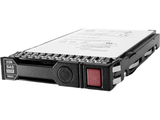Maximizing Performance and Reliability with HPE SSDs for MSA 1040/1042 and MSA 2040/2042 SAN Storage Systems
In today’s data-centric world, businesses are constantly looking for ways to improve the performance, reliability, and efficiency of their storage solutions. Hewlett Packard Enterprise (HPE) has long been a leader in the storage industry, and their Modular Smart Array (MSA) line of storage systems is a popular choice for small to medium-sized businesses. Among the offerings in this line, the MSA 1040, MSA 1042, MSA 2040, and MSA 2042 SAN Storage solutions stand out. One of the key components that can significantly enhance the performance of these systems is the use of HPE Solid State Drives (SSDs).
Why SSDs?
Solid State Drives (SSDs) offer a number of advantages over traditional spinning Hard Disk Drives (HDDs). These benefits include:
Faster Performance: SSDs use flash memory, which is significantly faster than the spinning disks in HDDs. This translates into faster data access, quicker application load times, and overall improved system performance.
Lower Latency: SSDs provide lower latency compared to HDDs, which means data can be read and written much faster. This is crucial for environments where quick data access is essential, such as in virtualized environments or for running critical applications.
Higher Reliability: Without moving parts, SSDs are less prone to mechanical failure. This reliability is critical for maintaining the availability of data in storage systems.
Energy Efficiency: SSDs consume less power than traditional HDDs, reducing the overall energy consumption of your storage system. This is beneficial both from a cost-saving perspective and for minimizing environmental impact.
MSA 1040/1042 and MSA 2040/2042 Overview
The HPE MSA 1040 and 1042 are entry-level SAN storage solutions that provide affordable performance for smaller environments. The MSA 2040 and 2042, on the other hand, are mid-range solutions that offer higher performance and scalability for growing businesses. Both series support a variety of configurations, including hybrid arrays that combine SSDs with traditional HDDs.
Compatibility of SSDs with MSA Storage
HPE has engineered SSDs specifically designed to work seamlessly with the MSA storage systems. When considering SSDs for your MSA 1040/1042 or MSA 2040/2042, you must ensure compatibility with the specific model and firmware version. HPE offers several SSD options for MSA storage systems, including different capacities and performance levels to suit varying workloads.
1. HPE MSA Read-Intensive SSDs
These SSDs are ideal for read-heavy workloads such as archiving, data analytics, and backup operations. They offer high performance for sequential reads, making them an excellent choice for environments where data is mostly read rather than written.
2. HPE MSA Mixed-Use SSDs
Mixed-use SSDs provide a balanced performance for both read and write operations. They are well-suited for general-purpose applications and virtualized environments, where the workload involves a combination of both data reads and writes.
3. HPE MSA Write-Intensive SSDs
Write-intensive SSDs are designed for environments with high write operations, such as databases, transaction processing, and high-performance computing. These SSDs deliver the highest levels of endurance and performance for write-heavy applications.
Benefits of Using SSDs in MSA Storage Systems
1. Improved Performance
Adding SSDs to your MSA 1040/1042 or MSA 2040/2042 storage systems can significantly boost performance. For example, using SSDs as a tier in a hybrid array can accelerate frequently accessed data, resulting in quicker response times for applications and users.
2. Enhanced Data Protection
HPE SSDs feature advanced data protection technologies such as end-to-end data path protection, error correction code (ECC), and power loss protection. These features help safeguard your data against corruption and loss, ensuring the integrity of your storage system.
3. Better Scalability
HPE SSDs allow for greater scalability within your storage system. As your data needs grow, you can easily add more SSDs to increase storage capacity and performance. The MSA 2040/2042, in particular, supports scaling both capacity and performance, making it a future-proof investment.
4. Cost-Effective Storage Solutions
While SSDs may have a higher upfront cost compared to HDDs, their benefits in terms of performance, reliability, and energy efficiency make them a cost-effective solution in the long run. Additionally, HPE’s hybrid configurations allow you to combine SSDs with HDDs, optimizing cost and performance.
Conclusion
Incorporating HPE SSDs into your MSA 1040/1042 or MSA 2040/2042 SAN storage systems can lead to significant improvements in performance, reliability, and efficiency. Whether your workload is read-intensive, write-intensive, or a mix of both, HPE offers a range of SSD options that are compatible with MSA storage systems. By leveraging the power of SSDs, businesses can future-proof their storage infrastructure while optimizing their IT investments.
If you’re considering upgrading your storage system or enhancing its performance, HPE SSDs for MSA storage should be at the top of your list.
Recent Posts
-
Accelerate Your Enterprise: Unleashing the Power of the HPE 300GB 15K RPM SAS-12Gbps Smart Drive
In today's enterprise IT environments, the demand for high-performance, reliable, and secure storage …Jan 28th 2025 -
Accelerate Enterprise Performance: Exploring the HPE 900GB 10K RPM SAS-12Gbps Hard Drive for ProLiant Servers
In the realm of enterprise computing, choosing the right storage solutions is critical for achieving …Jan 27th 2025 -
Secure and Reliable Storage: HPE 1TB 7200RPM SAS-12Gbps SFF Hard Drive for ProLiant Servers
The HPE 1TB 7200RPM 2.5-inch Small Form Factor (SFF) Digitally Signed Firmware Hard Drive is a robus …Jan 22nd 2025




